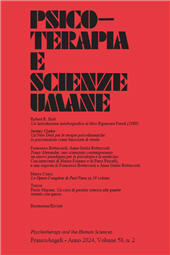Un New Deal per le terapie psicodinamiche : lo psicoanalista come burocrate di strada
199-250 p.
In Inghilterra nel 2007 è stato avviato un esperimento nazionale con l'obiettivo di affrontare "il più grande problema sociale del Paese": la depressione. È stato così lanciato il programma Improving Access to Psychological Therapies (IAPT), che consiste nell'offrire terapie psicologiche evidence based a tutti i pazienti con depressione e ansia. Il NICE (National Institute for Health and Care Excellence) stabilì che la terapia cognitivo-comportamentale (cognitive-behavior therapy [CBT]), non i farmaci, doveva essere la prima scelta. La via era spianata. Lo IAPT si propose tre obiettivi: aumentare rapidamente l'accesso alla CBT, diminuire la prevalenza di depressione e ansia e, il più ambizioso, ottenere un guadagno per le casse dello Stato riducendo il peso economico della depressione, cioè abbassando le assenze lavorative per malattia. Era un New Deal per la depressione, e anche per la CBT.
Ma ha funzionato? Noi psicoanalisti siamo disposti a cogliere ciò che ci ha insegnato lo IAPT e sostenere un New Deal per la psicoanalisi evidence-based? Di fronte alle sfide della disoccupazione, delle crescenti disuguaglianze, del cambiamento climatico, delle guerre e dei lutti dovuti alla pandemia di COVID-19, la necessità di questo New Deal non può essere più urgente. [Testo dell'editore].
In the UK in 2007 a national experiment was initiated with the aim of tackling "Britain's biggest social problem" : depression. Improving Access to Psychological Therapies (IAPT) was devised as the solution. A universal free to access talking therapies program would make available evidence based treatment to all patients with depression and anxiety disorders. NICE (National Insti-tute for Health and Care Excellence), the body that decides on what is costeffective, said cognitive behavior therapy (CBT), not medication, should be its first line offer. The starting gun was fired. The promise from IAPT was 3 fold: to scale up access to CBT rapidly; to achieve recovery targets that would reduce the prevalence of depression and anxiety disorders over time and most ambitious of all to ensure the Treasury would see a return on its investment by reducing the economic burden from depression. People who were on invalidity benefits due to depression would be supported back into employment.
It was a New Deal for depression, as well as for CBT. But did it work? A decade and a half on with IAPT, are we in any position to give an answer? It is attempted to draw lessons about "what worked", and what didn't, to ask ourselves a question: are we those of us in the applied psychoanalytic community willing to garner what can be learned from IAPT to advocate a New Deal for evidence-based psychoanalysis? Faced with challenges from unemployment and widening inequalities, against a backdrop where global economic recovery must heed the existential threats from climate change and warfare, to say nothing of the scale of loss and grief for those already impacted by bereavement due to the pandemic, the need for such deal could not be more urgent. [Publisher's Text].
Ist Teil von
Psicoterapia e scienze umane : LVIII, 2, 2024-
Artikel aus derselben Ausgabe (einzeln erhältlich)
-
Informationen
ISSN: 1972-5043
KEYWORDS
- Improving Access to Psychological Therapies (IAPT), Terapia dinamica interpersonale breve (Dynamic Interpersonal Therapy [DIT]), Psicoanalisi evidence-based, Burocrati da strada, Psicoterapia per tutti
- Improving Access to Psychological Therapies (IAPT), Dynamic Interpersonal Therapy (DIT), Evidence-based psychoanalysis, Street-level bureaucrats, Universal psychotherapy


